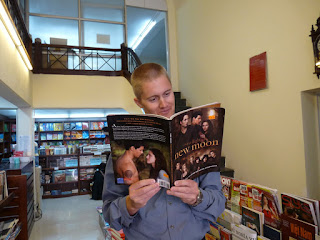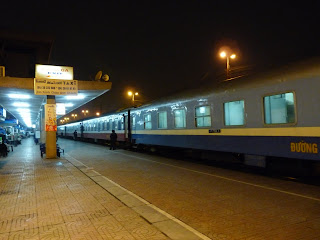Prior to arriving in Southeast Asia, I had not had the time nor the inclination to do much reading apart from trip research (online travel blogs, magazines, etc.). When my mom & step-dad met us in Turkey in late October, they brought my last subscription issue of Vanity Fair plus a couple of travel magazines and "To Asia With Love," a book I had ordered prior to leaving the U.S. It wasn’t until we were in Hanoi, Vietnam that I purchased my first non-travel-related book, "The Help." I was hoping to find something more relevant to our trip (i.e. fiction or non-fiction set in a place we had visited or would be visiting), but I have already read a lot of popular travel writing and couldn’t find any of the books on my trip reading list. We went into multiple bookstores in Hanoi and had one particularly amusing conversation with a Vietnamese store owner who had ordered 30-some-odd copies of Sarah Palin’s book “Going Rogue” but she had only managed to sell two copies in the past two years!
 |
| Greg tries to keep a straight face while looking at a "New Moon" book in a Hanoi bookstore |
I actually enjoyed reading "The Help," by Kathryn Stockett, which is about black domestic servants working in white Southern households in the early 1960s. By the time we reached Hoi An, I had finished the 464 page book and traded it for "Wild Swans." I also picked up "Phra Farang" which was on my Thailand reading list.
I wish I had read "Wild Swans" by Jung Chang before we visited China on our RTW trip. It proved to be an excellent primer on China’s recent history, covering 1909-1978 and three generations of women in one family (the author’s). While I’m sure the author is biased, as the book is an autobiography of sorts, I think her depiction of events in China during those years is quite accurate. More important, the book increased my awareness of the horrors of war and government oppression endured by generations of Chinese, and thus helped me to better understand the toughness of the people that I mention in my multiple China blog posts.
 |
| Greg reading "Wild Swans" on the beach in Koh Chang, Thailand |
Now that we are on a beach in Thailand, I have more time for leisurely reading. After finishing "Wild Swans," which I passed on to Greg, I read "The Great Railway Bazaar" in just over 24 hours. Paul Theroux’s classic & brilliant chronicle of his 4-month journey by train from London, across Europe and Asia, and back via Soviet Russia is still relevant despite first being published in 1975. His descriptions of many of the same places Greg & I have traveled on our RTW trip are both witty & thought-provoking. I found the book imminently quotable and wished I had read it a bit earlier during our trip so I could have made a few comparative references to it in my blog posts.
 |
| the overnight train from Hanoi to Hue, Vietnam |
My next literary conquest was "Phra Farang" which is a true story about a middle-aged English man (the auther, Peter Pannapadipo) who became a Buddhist monk and lived at various wats in Thailand for ten years. While he eventually disrobed to focus running a charitable organization called
The SET Foundation (which he started as a result of his experiences as a monk), the book is fairly enlightening on many aspects of life as a monk in Thailand.
 |
| novice monks in Chiang Mai, Thailand |
I had then run out of books and unfortunately found the used bookstore near our resort on Koh Chang a bit pricey (average book was 250 baht or over $8), so I snagged the ONLY English language book from the resort’s collection (everything else was in German or one of the Scandinavian languages). "Faceless" by Martina Cole was not exactly my preferred type of novel, nor was it in any way relevant to our travels, but I was desperate! I also gave in and purchased one book at the used bookstore called "A Brief History of the Great Moghuls" which is about India’s rulers in the sixteenth & seventeenth centuries and therefore relevant to our next destination.
When we reached our resort on Koh Kood, I traded "Phra Farang" for one of the few English language books on their bookshelf, "Geisha" by Liza Dalby. Dalby is an anthropologist who, in the pursuit of material for her Ph.D. dissertation, apprenticed as a geisha in Kyoto in the mid-1970's. This is a scholarly work filled with Japanese history and cultural observations. As we visited Japan for a few weeks in September, I found this book to be both interesting & useful for appreciating the differences in our cultures, even though we are months removed from our travels there.
 |
| a geisha in Gion, Kyoto |
Ultimately, good travel writing, whether fiction or non-fiction, can enhance any trip you take. Even if you are not leaving the U.S., but simply traveling to another state or region, a book set in that area or whose subject is specific to that part of the country can reveal something about the landscape or people that you may have missed otherwise.
No comments:
Post a Comment